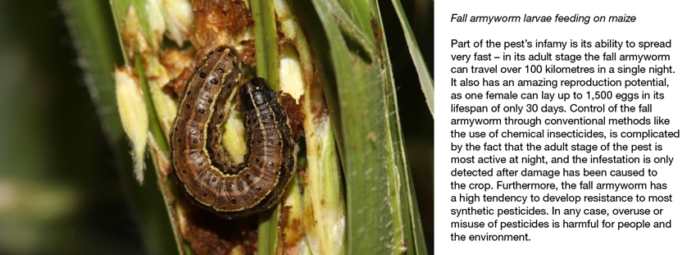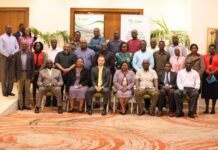The International Centre of Insect Physiology and Ecology (icipe) has received a grant amounting to EUR 2,999,760.58 through the Fund for the Promotion of Innovation in Agriculture (i4Ag), to upscale the Centre’s highly successful, integrated pest management package for the fall armyworm. Through a project known as Agroecological Innovations for Smallholder Pest Management (EcoPM), icipe and partners will reach one million farmers in Malawi, Uganda and Zambia.
The fall armyworm is a destructive moth that causes devastating damage to almost 100 plant species, including cereals, grasses and a variety of horticultural crops. For long, the pest was confined to its native origin, the Western Hemisphere (from the United States of America to Argentina). However, in January 2016, the fall armyworm was reported in Nigeria, and since it has spread at an alarming rate across Africa; its presence now is confirmed in most African countries. By 2022, the fall armyworm had caused an average annual loss of 36 percent in maize production alone; and a total economic loss of between USD 1 – 4.6 billion per year in Africa. Moreover, the pest’s hazard piles onto, and escalates a range of existing agricultural challenges caused by climate change which has led to drier and hotter weather, depleted soils, and increased outbreaks of indigenous and invasive pests.
“Since this notorious pest invaded Africa, icipe’s vision has been to provide farmers with science-led, context specific, affordable and environmentally friendly solutions for its management,” says Dr Segenet Kelemu, icipe Director General & CEO.
“Through extensive research on the pest’s ecology in Africa, icipe has developed a climate-smart, agroecological management package that addresses the direct damage by the fall armyworm, as well as the range of obstacles affecting cereal production in Africa,” notes Dr Thomas Dubois, icipe Head of Plant Health Theme and lead researcher of EcoPM. “The package integrates the icipe push–pull technology, natural enemies, biopesticides and sex pheromones.” *(see comprehensive infographic below).
The fall armyworm management innovations developed by icipe are already being used by farmers in various countries in Eastern and Southern Africa, where they are highly effective. The support from the i4Ag will enable icipe to test and adapt them to local, smallholder farmers environments, through a public-private-people partnership approach. The EcoPM initiative will use innovative and inclusive dissemination mechanisms, including digital tools like social media networks and multi-stakeholder platforms, as well as non digital tools.
The partners will monitor fall armyworm dynamics, develop early-warning systems, assess demand for innovations, facilitate knowledge exchange and feedback from end-users, and target disadvantaged groups, especially women and youth. Scientific evidence and socio-economic knowledge of the fall armyworm innovations value chains will support awareness creation, facilitate adoption, inform policy decisions and, ultimately, ensure the sustainability of the project.
The Fund for the Promotion of Innovation in Agriculture (i4Ag) is implemented by the Deutsche Gesellschaft für Internationale Zusammenarbeit (GIZ) GmbH. ) on behalf of the German Federal Ministry for Economic Cooperation and Development. It promotes innovations in the agriculture and food sector, focusing on the six key areas of mechanisation, digitalisation, renewable energy, research and extension, cooperation with the private sector and agricultural policy. Innovation refers to interventions that change existing routines or introduce new ones. Examples include digital, technical, organisational, administrative or financial products, processes, services, technologies and business models. The fund casts a wide net in its search for innovations and is not restricted to a specific region, technology or value chain.
The International Centre of Insect Physiology and Ecology : working through the 4Hs Themes – Human Health, Animal Health, Plant Health and Environmental Health, the Centre conducts world-class science, and then translates this knowledge into innovate environmentally friendly, affordable, accessible and easy to use solutions to tackle crop pests and disease vectors. icipe’s role also extends to the conservation and sustainable exploitation of the beneficial insect biodiversity. We gratefully acknowledge the support of icipe core donors: Swedish International Development Cooperation Agency (Sida); Swiss Agency for Development and Cooperation (SDC), Federal Democratic Republic of Ethiopia and Government of the Republic of Kenya. The views expressed herein do not necessarily reflect the official opinion of the donors.









